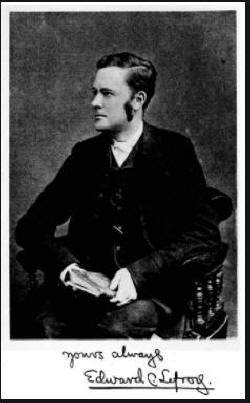

Queer Places:
University of Oxford, Oxford, Oxfordshire OX1 3PA
Cranham Farm, near Cheltenham, Gloucestershire
Old Inn, East Clevedon,
Somersetshire
 Rev. Edward
Eugene Cracroft Lefroy (29 March 1855 - 19 September 1891) was an English
poet and cleric. Lefroy was one of the Victorian poets of homoerotic verse
and was related to Jane Austen. The Flute of Daphnis (1883) and A Palaestral Study (1883) are cited as
examples in Sexual Heretics: Male Homosexuality in English Literature from
1850-1900, by Brian Reade.
Rev. Edward
Eugene Cracroft Lefroy (29 March 1855 - 19 September 1891) was an English
poet and cleric. Lefroy was one of the Victorian poets of homoerotic verse
and was related to Jane Austen. The Flute of Daphnis (1883) and A Palaestral Study (1883) are cited as
examples in Sexual Heretics: Male Homosexuality in English Literature from
1850-1900, by Brian Reade.
Lefroy was born in Westminster, "almost beneath the eaves of Westminster Abbey," the son of George Benjamin Austen Lefroy (1818-1910) and Emma Cracroft, daughter of Thomas Edward Cracroft.[1] His paternal grandfather was Benjamin Lefroy, Rev., Rector of Ashe, Hampshire, and Compton, Surrey (1791-1829), who was, from his maternal side, Anne Brydges, a direct descendant of William the Conqueror, and who married Anna Austen Lefroy aka Jane Anna Elizabeth Austen (1792-1872), niece of Jane Austen, and a contributor to her life-history via the so-called Lefroy MS. At age 12 Edward Cracroft Lefroy attended a prep school in Blackheath. He became a frequent contributor to the school magazine, the Blackheathean, and its editor in 1873.[2] In October 1874 he matriculated at Keble College, Oxford,[3] where he was for a time editor of the Oxford and Cambridge Undergraduates' Journal,[4] and a frequent contributor (said to have written 49 articles in one term), as well as secretary of the Union Society, and a member of the college essay, literary, and debating societies.[5] He earned a B.A in June 1877.[6]
He entered Truro Theological Seminary, Cornwall in January 1876,[7] and was ordained curate of Lambeth in June 1878; but resigned due to illness the following Novmber.[8] In the spring of 1879, his health improving, he became curate of St. German's, Blackheath, [9] but again had to reason for health reasons in July 1880. In September he resumed clerical duties at St. John's, Woolwich,[10] where he served for 2 years; but again had to resign, on the advice of his doctor, in the summer of 1882.[11] Barred from preaching on his doctor's advice, he took up lodgings in Blackheath, where he took in private pupils,[12] and reviewed books for The Guardian.[13] During 1883 he also wrote and published 4 booklets of sonnets – Echoes from Theocritus, Cytisus and Galingale, Windows of the Church, and Sketches and Studies.[14] – and a volume of sermons.[15] His sonnets were commercially published in a volume in 1885 as Echoes from Theocritus and other Sonnets,[16] which was complimented by Christina Rossetti, Andrew Lang, Robert Browning, and Alfred, Lord Tennyson.[17] Also in 1885 he published another prose work, Counsels for the Common Life: Six addresses to senior boys in a public school.[18] He stopped writing in that year - even in his diary - but lingered on another 6 years, dying in 1891.[19]
William Sharp: "This gentleman, whom delicate health has prevented pursuing further the clerical profession, may be considered the living poetical brother of Hartley Coleridge and Mr. Charles Tennyson Turner: to the work of the latter his sonnets bear an especial affinity. They are simple in language, genuine in feeling, and poetic in expression, but they do not invariably fulfil the technical requirements of the legitimate sonnet. Of one thing it seems to me Mr. Lefroy has need to beware – that he does not lapse into the fatal Wordsworthian habit of rhyming upon everything he sees or thinks of: as yet his bark is sailing safely enough in that disastrous neighborhood, but once caught in the current – and there is an end of 'pure gems of white-heat thought carved delicately!'"[20]
My published books: